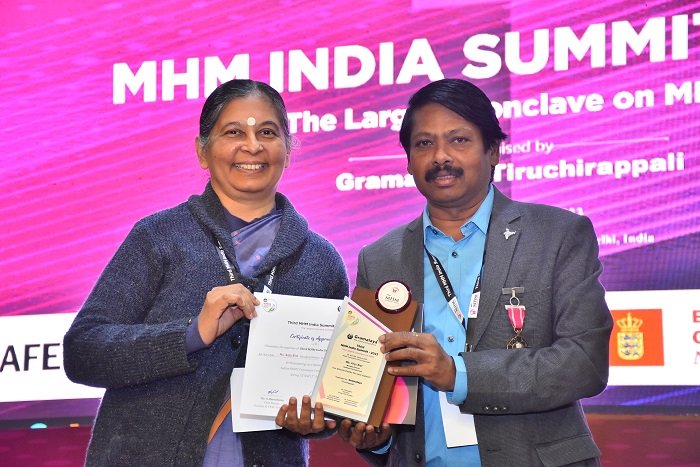
A Mata Amritanandamayi Math project – Saukhyam Reusable Pads set to revolutionise intimate hygiene market
Recently, Saukhyam Reusable Pads – the first women’s intimate hygiene brand that uses banana fibre as an absorbent has been awarded the ‘Best Social Initiative on Menstrual Hygiene’ at the third Menstrual Hygiene Management India Summit in New Delhi. The pads are made by women’s self-help groups in various states across India in recognition of its endeavours to empower women in rural areas.
Usually, when it comes to menstrual hygiene products, environment-friendly, reusable and economical do not generally gel together. But for Saukhyam Reusable Pads – a project of the Mata Amritanandamayi Math – these are exactly the talking points. The sustainable, healthy and environment-friendly features of Saukhyam Reusable Pads have been set to revolutionise the intimate hygiene market.
Made from banana fibre and cotton cloth, these menstrual pads cost just one-tenth of conventional ones. Health experts too now recommend cloth sanitary pads for a healthy menstrual cycle.
There are anecdotal proofs that girls who used Saukhyam reusable pads got rid of period rashes and even did not feel cramps. And this can be attributed to banana fibre’s antiseptic and anti-spasmodic properties.
“Over five years ago, WaterAid India and Unicef, following a survey, claimed that lack of access to toilets and sanitary pads in schools causes over a third of girls in South Asia to miss school. This led to the coinage of the term ‘period poverty,” said Dr Swadeep Srivastava, Founder & Chairman, HEAL Foundation.
“Despite tangible evidence about chemicals getting absorbed in the body and causing reproductive harm, women are often very hesitant when it comes to choosing good quality sanitary products. In India, around 35.5 crore women need sanitary pads and a majority of them are in rural areas. With awareness and by making reusable menstrual pads accessible, women can be empowered to choose what best suits them,” added Dr Srivastava.
Deliberating on the health advantages and safe use of reusable pads Dr Radhamany K, Prof & HoD, Obstetrics and Gynecology, Amrita Hospital, Kochi, said, “With awareness about the chemical additives that disposable pads contain is on the rise, and reusable variants are being favoured more. As long as they are washed and dried properly, reusable sanitary pads are completely safe. And not just chemical additives, disposable pads are also harmful to the environment. The absorbent material in such sanitary pads is cellulose fibre which is sourced by cutting trees. Switching to reusable options for intimate care also saves trees and in turn helps in combating climate change.”
Recent research on 10 different brands of disposable sanitary pads available in the Indian market has found the presence of dangerous chemicals and toxins. Knowledge about reusable menstrual pads and access to it is still limited which is the major impediment towards making this product a success.
Saukhyam’s Award Basket
· Saukhyam Reusable pads were also honoured with the Most Innovative Product Award by the National Institute of Rural Development, India.
· The project was lauded at the UN Climate Change Conference (2018) in Poland for its sustainable financing mechanism.
· In 2020, the Saukhyam team was recognised as the Social Enterprise of the Year for its “exceptional impact, clarity and growth of work dedicated to furthering the UN Sustainable Goals” by the women of India and the Social Founder Network coalition.
Reusable sanitary pads are being sold in many countries such as the US for decades now, unlike in India where it is a recent phenomenon. In 2021, the Bureau of Indian standards notified ISO standards for reusable sanitary pads.
Last year, Niti Aayog honoured Saukhyam with the Women Transforming India Award and the reusable sanitary pads were designated as a “strong root for tomorrow’s India”.
The Saukhyam initiative was started in 2017 by Sri Mata Amritananadamayi Devi – the spiritual and humanitarian leader – popularly known around the globe as Amma. The aim was to make high-quality and environment-friendly sanitary pads available in rural areas at a nominal price.
Today, Saukhyam sanitary pads are sold not only in India butalso in the US, the UK, the Netherlands, Spain, Kuwait, Nepal, Mexico and Malaysia. So far, over 1 million pads have been sold and distributed in terms of fighting climate change translates to preventing the emission of 4,000 tonnes of carbon dioxide equivalent and also helped in preventing 1 lakh tonnes of non-biodegradable menstrual waste.
Team Saukhyam is now looking at setting up large-scale production centres with a combined annual capacity of 12 million pads.
